Abraham Lincoln could not vote for his own reelection in 1864. His home state of Illinois required all voters to physically present themselves at the polling station in order to exercise their franchise. In the midst of a national emergency—the Civil War—the president of the United States could not leave the capital and thus was effectively disenfranchised.
Voting rules denied the leader of the nation his right to vote. Voting rules should not similarly disenfranchise Americans during the COVID-19 emergency.
Along with Illinois, the states of Indiana, Delaware, New Jersey and Oregon limited the right to vote in the election of 1864 only to those who physically went to the polls. This meant that many of the soldiers fighting to preserve the union were disenfranchised just like their commander in chief. Seventeen states, however, changed their voting rules to permit one form or another of the “soldier vote” from the field.
Now is the time to consider if and how we change our rules so that COVID-19 does not disenfranchise Americans. Two facts are undeniable: we are in the midst of a national crisis of indeterminate length, and every American has the right and responsibility to cast their vote. Now is the time to start preparing for COVID-19’s impact on the November 3, 2020 election.
In the current emergency, there is a national policy against large gatherings. If you do go out, six feet of social distancing is recommended. Queuing in long lines at polling stations in order to enter a small enclosure just vacated by someone of unknown health is not in keeping with prevailing medical advice.
Hopefully, the COVID-19 crisis will have run its course by November—although increasingly we are being warned to expect its return in the fall even if it does lessen in the summer. Our government was apparently unprepared for the novel coronavirus despite warnings; let us not repeat that again when it comes to the election. With election day eight months away, what are we doing now to prepare to protect our citizens’ right to vote (and the health and safety of poll workers)?
Two days after the November 1864 election, Lincoln reflected that “until now it has not been known to the world that this [election] was a possibility.” As if speaking to us today, he said, “We cannot have free government without elections; and if the rebellion could force us to forego or postpone a national election, it might fairly have claimed to have already conquered and ruined us.”
Our test is similar: could COVID-19 “conquer and ruin” our defense of the most basic democratic right? Will the world’s bedrock of democracy protect the key to democracy? Thus far this year, multiple states have delayed their primary elections. There is much less flexibility insofar as the national election. Congress in 1845 established the first Tuesday after the first Monday in November as the date of the general election. The 20th Amendment to the U.S. Constitution, guiding off that schedule, mandated that the new Congress convene on January 3 and the President be inaugurated on January 20.
The message here is simple: we have an eight-month head start. Let’s not treat protecting the exercise of the democratic franchise as something that sneaks up on us. Denying the potential problem or waiting to see whether COVID-19 reappears in the fall before we act is not a solution. While some complain voting by mail and other solutions will cause confusion and the potential for fraud, one sure way to assure problems is to ignore until too late the reality we can now readily identify.
Senators Ron Wyden (D-OR) and Amy Klobuchar (D-MN), along with 24 other senators have indicated they intend to introduce the Natural Disaster and Emergency Ballot Act of 2020 to allow for national vote-by-mail as well as the expansion of early voting. That all the sponsors are Democrats illustrates how the issue has often been perceived as partisan. Yet 33 states currently give their citizens the right to vote-by-mail without any extenuating excuse. Colorado, Washington State, and Oregon have all-mail elections.
The effect of opening the franchise to soldiers in the field was partisan in 1864 as well. The Democrats felt they would benefit from the soldier vote. After all, their candidate was former Union commander General George B. McClellan and surely his former troops would stand with him. “We are as certain of two-thirds of that vote for General McClellan as the sun shines,” one Democratic newspaper publisher predicted.[i] Lincoln expected to lose. He even had his cabinet sign a pledge to continue to work to preserve the union in the period after his defeat but before the inauguration. In the end, however, it was the Republican Lincoln who won 55 percent of the popular vote, including 75 percent of the soldier vote.
Lincoln’s concern that the national crisis “could force us to forego or postpone” the election made him stand firm to protect it. He—and the Republican Congress—could have, but did not, change the date of the election. [ii]
Ultimately, the democratic right to vote was protected in 17 states because leaders stepped up and made the statutory changes necessary to assure citizens their franchise. Now is the time to anticipate the challenge that will confront us in only a few months and act once again to preserve the franchise.
“You cannot escape the responsibility of tomorrow by evading it today,” Lincoln once observed. Today is our moment of responsibility.
[i] Doris Kearns Goodwin, Team of Rivals, Simon & Schuster, 2005, p. 663
[ii] The Senate had a Republican majority, the House a Republican plurality
The Brookings Institution is committed to quality, independence, and impact.
We are supported by a diverse array of funders. In line with our values and policies, each Brookings publication represents the sole views of its author(s).
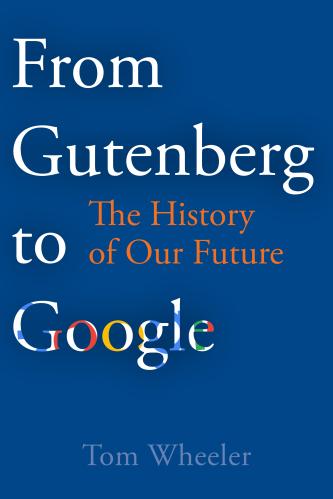
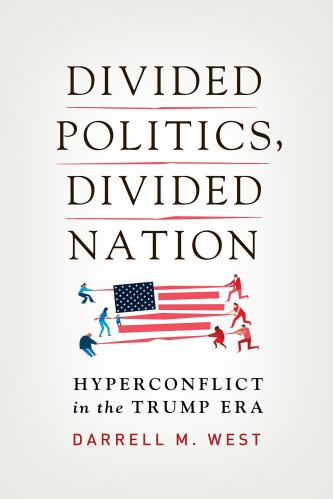
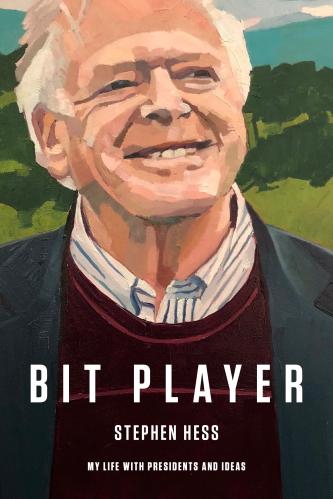
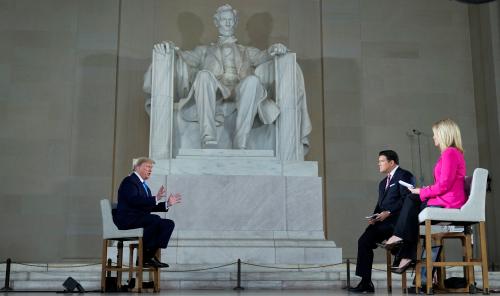
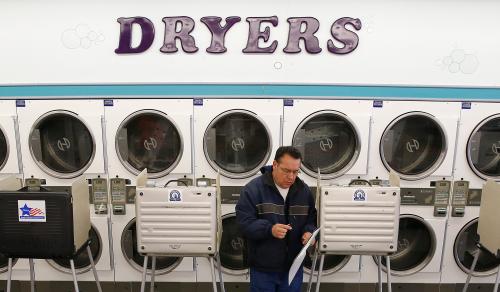
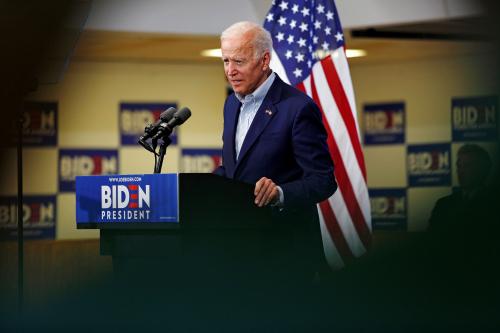




Commentary
Voting in a time of national emergency
March 23, 2020